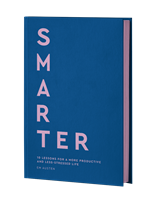In a world that often seems to whirl by at breakneck speed, leaving us breathless and burdened with endless to-do lists, it’s no surprise that 76% of us feel engulfed by the weight of our obligations, with a majority yearning for better control over our energy and time. Ironically, the busyness cult has made us less productive than ever before, leading us to equate value to how early we wake up, how busy we are and how tired we look.
The ‘5am club’ has seeped into the vernacular as a symbol of productive status. We’ve been told that an acrobatic morning routine is the key to success. A reason many successful people lie about getting up earlier is due to the perceived stigma and shame connected to being a later riser. If I had a dollar for every time I’ve lied about getting up early, I would be rich beyond my wildest dreams. I wanted the perception to be that I was a superpower in the making.
But now, the ‘8am club’ has emerged as a transformational way to enhance wellbeing, challenging some of the performative productivity ideals we subscribe to and proving that the 5am club, as we know it, is outdated.
Rise and shine
The 8am club is not necessarily a hard start at 8am. Whilst it’s wonderful if you have the choice to rise at 8am, some (ok, most) of us don’t. But the 8am club is a metaphor that helps you discover that it's not about rising early for the sake of appearances, but rather about consciously choosing to invest in the aspects of life that hold real significance, aligning your daily actions with your core values and genuine aspirations. Understanding your chronotype, connecting with your natural rhythms and syncing with your circadian rhythm unlocks powerful potential.
It is with great pleasure that I tell you that getting up earlier doesn’t actually make you more productive. Waking up at 5am had negative effects on me. I worried the night before that I wouldn’t get enough sleep. I felt like a personal failure when I inevitably hit snooze. I lied to people about my routine and then I felt ashamed for lying (and ashamed that I felt like I needed to lie). I craved sugar and caffeine during the day. I was exhausted by early afternoon, skipping the gym and cancelling plans due to fatigue.
There was literally nothing positive for me in the 5am club, and yet I was willing, at great personal expense, to be part of a routine that didn’t work for me, because of the status it offered and the shame I would feel if I wasn’t included. My issue wasn’t that I was trying to get up at 5am; my issue was that I was trying to live by a rhythm that wasn’t natural for me.
Now here are the personal effects I’ve experienced as a member of the 8am club:
-
I wake up feeling better rested.
-
I enjoy a more relaxed morning routine.
-
I feel more present for my morning.
-
I am more likely to make better decisions relating to sugar, caffeine and food.
-
I feel less sluggish after lunch.
-
I rarely miss an evening gym session.
-
I feel more in control of my energy and routine.
-
I feel proud that I am showing up for myself and my rhythm.
There are thousands of studies and books exploring sleep and how it supercharges all human activity. But whether it’s 8am, 7am or 9am, the only right time to rise is the one that works for you. The main takeaway should be that you need to have restful, balanced sleep – ideally, eight hours’ worth. A 2017 Harvard study found that it doesn’t matter whether you sleep early and wake up early or vice versa. The most important thing is that you’re consistent about your schedule.
No one thing can unlock transformation on its own, but making small steps that relate to meaningful change can set you off on the path towards a more controlled, balanced approach to your wellbeing. Taking charge of structures that work best for you as you start the day is hugely empowering and leads to long-term success. Reducing the amount of time you spend paying into performative systems that add no value is a game-changing way to live your life smarter.






